The state of Oregon has set an ambitious goal to graduate 100 percent of high school students by the year 2025. OPB is following more than two dozen six and seven-year-olds who are in the class of 2025. For the next twelve years, OPB aims to follow these students, in school and at home.
Oregon has an ambitious long-term goal for its public schools: that starting in 2025, every child will finish high school.
OPB is tracking the goals for the Class of 2025 by keeping up with more than 20 students from East Portland.
Top educators in Oregon are calling Oregon's new approach to that goal "collective responsibility."
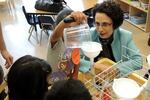
Nancy Golden watches two Earl Boyles Elementary School preschoolers.
Michael Clapp / OPB
Nancy Golden is watching two preschool girls as they dump water into plastic tubes, to see how it flows. As the state's chief education officer, she's rarely at the water play table. But Golden says preschool isn't about worksheets and sitting in a desk. It's about learning while playing.
"You know, when you think about kids who generally come to school ready to learn - this is what they're doing at home," Golden said. "They're sitting more with a parent, or a quality daycare, and they're doing these kinds of things. So, it's really about giving them the same opportunities, just in a school.
"That's one of the most misunderstood things about it. So we've got to get good at explaining that," Golden added.
Golden visited Earl Boyles Elementary, last month, as construction crews worked on a new $7 million preschool there.
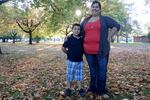
Angelina Madrid with her son Logan.
Michael Clapp / OPB
Earl Boyles has run a preschool classroom for a few years. But for most students at the school - like Angelina Madrid's son, Logan - kindergarten was their first school experience.
"So, we taught him as much as we could at home to get him ready for kindergarten," Madrid said. "So he just went straight into kindergarten. He didn't have any schooling."
Logan is now in first grade at Earl Boyles. He has a younger brother, though, and Madrid hopes that her younger son will attend the new preschool.
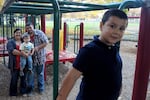
Logan with his parents and little brother.
Michael Clapp / OPB
"I was really excited to hear that it's opening up," Madrid said with a smile. "I knew that there was a preschool at Earl Boyles already, to know that they're building an extension - I can't wait."
Madrid's son Logan is in the Class of 2025. OPB intends to follow him and more than 20 others, to see how Oregon's 100 percent graduation goal is changing education.
Sometimes, Oregon's leaders downplay the goal as "aspirational." But Nancy Golden says the graduation goal she calls "40-40-20" is within reach, if kids start out right.
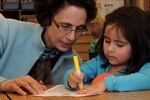
Nancy Golden visited Earl Boyles Elementary School and dropped by a preschool class.
Michael Clapp / OPB
"Everyone's saying we've got to start with preschool students, because if they come to kindergarten ready to learn, we can get to that 40-40-20 goal," Golden said.
Golden says on the flip side, if students still need extra help after third grade, they're unlikely to ever catch up. And the key to helping kids at every level, at a meeting of the Early Learning Council in February, Golden called it:
"Collective responsibility - and I think that's a really big concept."
Educators say that graduating successful young people will take more than the public schools can do on their own. The state wants help. But, while Oregon has spent millions on new strategic investments, Golden argues "collective responsibility" doesn't mean collecting big checks from the state.
"Now, since we've made these strategic investments - I'm hearing people say 'Well, if you want me to do that, you've got to give me a strategic investment.' And that was never what it was intended for," Golden said.
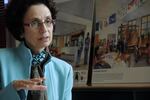
Nancy Golden
Michael Clapp / OPB
David Douglas voters approved a bond to cover half the new preschool's cost. City, county, and private funds are coming in, but a funding gap remains. The state hasn't spent anything on it, though district officials expect some money after it's built.
"Collective responsibility" doesn't end at pre-school.
After-school programs are part of the formula, too.
Mayor Charlie Hales has offered money from the City of Portland to bolster the Schools Uniting Neighborhoods - or SUN school - program.
"We're going to help more of our kids succeed, by expanding the number of SUN schools, from 70 to 80," Charlie Hales announced recently.
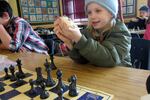
Dude shows off chess pieces captured from his sister Daisy Jane during SUN after school program.
Rob Manning / OPB
Earl Boyles already has a SUN program, where kids stay after school to read, do art projects, and it's where Dude and his older sister Daisy Jane, play chess. Dude is part of the Class of 2025.
"I'm winning right now, because I have two," Dude boasts. His sister is having none of it. "No, you're not winning," Daisy Jane counters. "You're not even close, you're not even close to my king."
Some education researchers often connect the student achievement gap to out-of-school factors like poverty, even housing policy. Oregon's new brochure on "collective responsibility" tries to address that by reaching out to non-profits, local governments, businesses, on problems like hunger and homelessness. State education leaders are being careful.
"It always makes me nervous, when we start trying to say 'Whose responsibility is it?'" says Rob Saxton, Oregon's deputy superintendent of public instruction.
Saxton doesn't want the breadth of problems to let schools shirk their responsibility.
"Even though we recognize it probably isn't ours, solely - if we acted as if it was ours, solely," Saxton suggests, "and all other partners who have some responsibility would act the same way - what a different dynamic that might look like."
This project is part of American Graduate — Let’s Make It Happen! — a public broadcasting initiative to address the drop out crisis, supported by the Corporation for Public Broadcasting.

